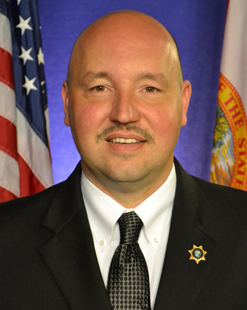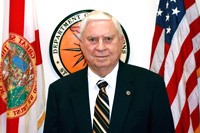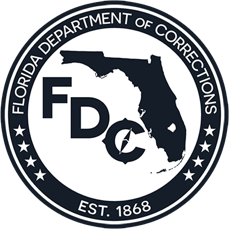2021 CONTINUED
SECRETARY RICKY D. DIXON

Secretary Ricky D. Dixon
November 19, 2021, Governor Ron DeSantis announces the appointment of Secretary Ricky D. Dixon.
Dixon began his career with the Florida Department of Corrections (FDC) as a correctional officer, working his way up to the top job during his 25-year career with the Department. He became Deputy Secretary in August 2015, and during that time he oversaw the largest evacuation of inmates in Florida corrections history when Hurricane Irma bore down on Florida, helping to establish Florida as a national leader in hurricane response. As Deputy Secretary, Dixon was responsible for the overall operation of the agency and worked collaboratively with each program area to ensure the mission of the Department was accomplished.
As Deputy Assistant Secretary of Institutions from 2012-2015, Dixon was responsible for the administration and management of FDC’s 50 major correctional institutions and their associated facilities. Facility missions range from death row and other high custody units to female units, work camps, community and work release centers, road prisons and residential treatment facilities.
Dixon began his career as a Correctional Officer at Lancaster Correctional Institution in 1996. He promoted through the security ranks and was appointed Correctional Officer Colonel of Florida State Prison. Following this appointment, he gained experience as an Assistant Warden at Martin and Okeechobee Correctional Institutions and was later promoted to Warden, a position he held at three state correctional institutions. He was then promoted to Regional Director of Institutions overseeing approximately one third of Florida’s prisons.
Over the course of his career, Dixon has been certified as an instructor in every major facet of correctional training including firearms, defensive tactics, ethics, field training and hostage negotiation. He was asked to assist with the development of the American Correctional Association’s Correctional Behavior Health Certification exam, which is used nationally to certify correctional mental health professionals. His experience also includes time as an auditor, ensuring all institutions meet or exceed operational review standards.
A Certified Corrections Executive with the American Correctional Association, Dixon has a bachelor’s degree in criminal justice from Florida Gulf Coast University. He is a graduate of the Florida Department of Law Enforcement’s Executive Seminar.
When Dixon is appointed, the Florida Department of Corrections is the third largest state prison system in the country with a budget of $2.9 billion, approximately 80,000 inmates and 146,000 offenders on community supervision. As Florida’s largest state agency, FDC employs 23,000 staff.
FORMER SECRETARY LOUIE L. WAINWRIGHT, SR. DIES

Louie L. Wainwright, Sr.
December 23, 2021, passing of former Secretary Louie L. Wainwright, Sr. Wainwright was the longest-serving Secretary in Florida Department of Corrections history, with a tenure that spanned a quarter century. In April 1955, he was shot by an escaping inmate, along with Assistant Warden Jim Godwin, who died, and CO Les Dobbs. Wainwright shepherded the Department of Corrections through being a Division (1962), to the Department of Offender Rehabilitation (1975), to the Department of Corrections (1978).
He was a strong proponent of accreditation and is credited with bringing the Department into the computer age and increasing professionalism by getting all prisons accredited through the American Correctional Association. He may be best known for being the named party in the Gideon vs. Wainwright lawsuit, where the Supreme Court ruled that the Constitution requires the states to provide defense attorneys to criminal defendants charged with serious offenses if they can’t afford lawyers themselves. He was also the named defendant in Costello vs. Wainwright, a suit brought by inmate Michael V. Costello concerning prison overcrowding, healthcare, food and sanitation that lasted for decades before it was resolved.
He was committed to raising the level of recognition for Correctional Officers and Probation Officers to that of other first responders. He strongly believed correctional and probation officers and employees are as important to public safety as any other field of law enforcement and should be recognized as such.
In the 1970’s when advocating for a pay raise for his officers and staff, Mr. Wainwright appeared before a legislative committee and said “zookeepers make more money” than his officers. That year the legislature granted a raise for the officers.
Wainwright believed that positive change, second chances, rehabilitation, and successful re-entry are possible for inmates. Among the many programs he instituted at prisons included Alcoholics Anonymous meetings, ball games where prisons competed, computer classes, pretrial programs, college classes for inmates using Pell grants and for staff (at night). He invited the Jaycees and volunteers inside the prisons, and allowed inmates outside the prisons to speak to high school students. He had Indian River and Sumter CI’s built and made into Youthful Offender facilities at a time when there was only one Youthful Offender institution statewide. He even allowed the women inmates at Florida CI to enter a float in Governor Askew’s inauguration parade.
“We treated them like people. We were in the people business, I thought, and if you’re in the people business you ought to be trying to help people. And you do that by letting them know you’re concerned with their welfare,” said Wainwright.
 Click here to hear Secretary Wainwright talk about his legacy and prison reform.
Click here to hear Secretary Wainwright talk about his legacy and prison reform.
- 1821-1845
- 1868-1876
- 1877-1895
- 1900-1919
- 1921
- 1922-1924
- 1927
- 1928-1931
- 1932 | CHAPMAN
- 1933-1935
- 1936-1939
- 1940-1945
- 1946-1949
- 1950-1955
- 1956-1961
- 1962 | WAINWRIGHT
- 1963-1965
- 1966-1969
- 1970-1975
- 1976-1979
- 1980-1986
- 1987 | DUGGER
- 1988-1990
- 1991 | SINGLETARY
- 1992-1995
- 1996-1998
- 1999 | MOORE
- 2000-2002
- 2003 | CROSBY
- 2004-2005
- 2006 | MCDONOUGH
- 2007
- 2008 | MCNEIL
- 2009-2010
- 2011 | BUSS
- 2011 | TUCKER
- 2012 | CREWS
- 2013-2014
- 2014 | JONES
- 2015-2018
- 2019 | INCH
- 2020-2021
- 2021 | DIXON
- 2022-Today
- Population Summary Table

